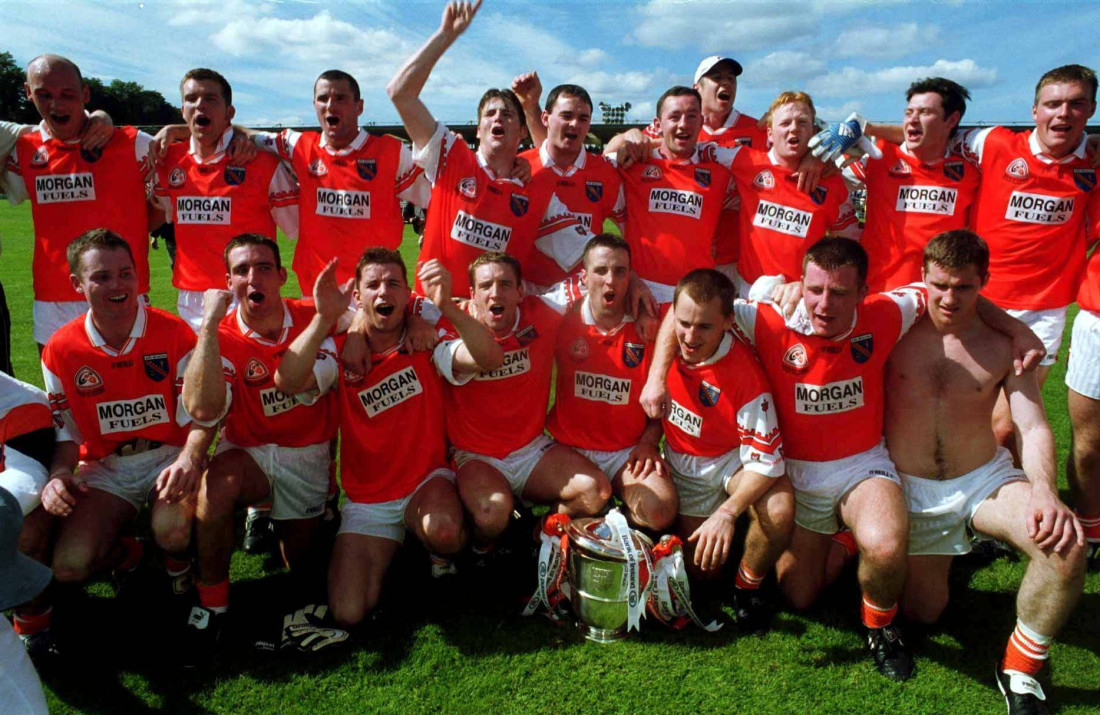The last time Derry and Armagh met in the Ulster showdown, club rivals and university teammates John McEntee and Joe Cassidy were in opposing corners. Michael McMullan caught up with them for a walk down memory lane.
WHEN Armagh minors began the defence of their Ulster title in a sun-kissed Athletic Grounds in May 1995, John McEntee and Joe Cassidy were in opposite corners.
Derry prevailed and went one better than Armagh ‘94, reaching the All-Ireland final with Cassidy hitting 3-14 in a campaign that finished with a gut-wrenching defeat to Westmeath.
By October, University of Ulster fresher manager Padraig ‘Bucket’ O’Neill – uncle of current Armagh star Rian – had the duo and their team plodding through the muck and gutters.
A UCC team with Cork hurling ace Joe Deane in attack surprised them in the final, but Cassidy and McEntee’s crossing of paths was only starting.
Both were picked out among a select handful of freshers added to ‘The Poly’s’ autumn 1996 – once in a lifetime – trip to Australia.
Joe Kernan was assembling a Crossmaglen squad laden with u-21s aiming to end a 10-year famine without the Gerry Fagan Cup.
The McEntees, Francie Bellew, Oisin McConville and Cathal Short were among the group to change the club’s history.
On the same day they easily accounted for Clan na nGael to end their famine in 1996, Cassidy was in action at Celtic Park helping Bellaghy to glory.
The previous Wednesday, the UUJ travelling party jetted off to Australia but McEntee and Cassidy had their flights deferred.
“Mammy and Daddy took me down to Crossmaglen, we left Bellaghy around 11 o’clock,” Cassidy remembers.
“We were in their club for about an hour and John’s parents took us on down to Dublin. Little did we know we’d be meeting each other eight weeks later in an Ulster Club final.”
Cassidy instantly jibes about McEntee’s equaliser forcing a replay. The second day, Bellaghy held Cross off until Cathal Short – another from the UUJ 1996 fresher team – shot them ahead for the first time to avenge the Tones’ 1986 win.
Crossmaglen would repeat the dose in the 1998 final with Bellaghy victorious on their 2005 Ulster Club visit to Cross.
“They were serious games and university life was pretty good too, so we knew each other quite well at that time,” McEntee explains.
“We were only kids and we had the opportunity to go to Australia on a holiday. It was unbelievable craic; it was one of the best holidays I was ever on.”
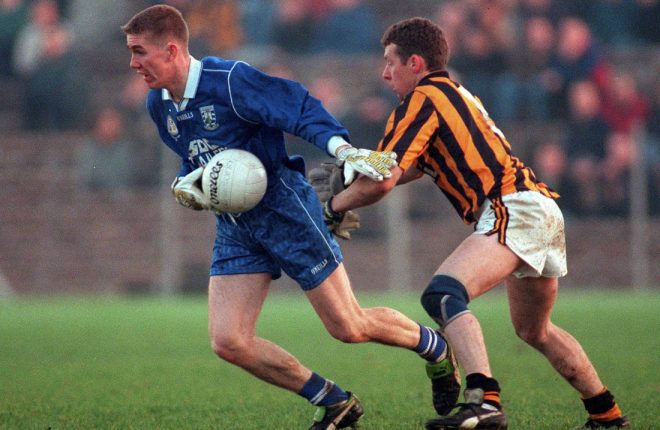
CROSSING PATHS…Joe Cassidy takes on Martin Califf in the 1998 Ulster Club final in Clones
***
For Cassidy and McEntee, the baby steps at senior level were totally different. A Derry team at the peak of its powers versus an Armagh group floundering about in the dark.
While Derry minors were narrow winners over Armagh in 1995, the senior game was a cakewalk. With 13 of their 1993 All-Ireland winning team on board, Derry were 1-17 to 0-10 winners.
By contrast, of the Armagh team that started the 2002 All-Ireland final, only Benny Tierney, Kieran McGeeney, Diarmuid Marsden and Paul McGrane saw action on that chastening Sunday. Kieran Hughes, Gerard Reid and Cathal O’Rourke played too. Oisin McConville, Barry O’Hagan and 1999 Ulster-winning skipper Jarlath Burns spent the entire afternoon warming the bench.
Marsden, McGrane, O’Hagan, Andrew McCann, Des Mackin and Justin McNulty came off the 1992 minor team beaten in the All-Ireland final.
From the 1994 minor team, Barry Duffy, Aidan O’Rourke, Enda McNulty, Tony and John McEntee came through.
The senior players of that era were holding on, eager for new blood to come along to quash Down, Donegal and Derry’s grip on Ulster.
“Armagh weren’t anywhere near that standard,” McEntee admits. “There were fellas like Martin McQuillan, who played for Ulster for years and he was a fine footballer.
“They were nearing the end and we managed to get a lot of fresh blood in at that one point in time.”
The Armagh players didn’t have the MacRory Cup success Derry had, but had the winning mentality rubbing off their Crossmaglen contingent. An Ulster u-21 title also came at Derry’s expense in 1998.
“We had a lot of success at club level and underage which Armagh teams didn’t have before that,” added McEntee, who made his senior championship debut in defeat to Derry at Clones in 1998.
Earlier that year, Cassidy – one of eight Derry players in Adrian McGuckin’s UUJ team – played alongside Barry Duffy and the McEntees in an enthralling Sigerson campaign that ended up in defeat to a star-studded IT Tralee team.
McEntee confesses the confidence, possibly even arrogance, from club success helped the county’s cause but admits to feeling inadequate when arriving at university. There was nearly an awe of those from other counties, with Armagh so far down the pecking order.
“There were a lot of fellas far more gifted than we were, but that Armagh team was a big, physically strong side,” he said.
Casting his eye over the 2000 Ulster final, McEntee contrasts the talent in Derry’s attack with Armagh’s stellar defence. Size matters. Gerard Reid, Andy McCann, Kieran Hughes, Kieran McGeeney, Enda and Justin McNulty.
“They were all big strong fellas and that physicality stood to them to a fair degree,” he offers, comparing to all the teams dancing at the top table. Armagh ticked that box then and are heading back in that direction.
***
Within three years of racing onto Croke Park to celebrate with older brother Damian’s team lifting Sam Maguire, Joe Cassidy was called into the Derry senior team after Bellaghy’s 1996 replay defeat to Crossmaglen.
Owenbeg was in its infancy and he recalls being nervous as he reported to the old prefab changing rooms for training. Sean Marty Lockhart had already been given his debut by the late Brian Mullins that summer.
“The person that sticks out in my head is Anthony Tohill,” Cassidy recalls of that first night.
“You feel you shouldn’t be there when you see a player of his stature and what he’d done. You were running onto Croke Park after Derry won the All-Ireland as a 16-year-old, now you were walking into a changing room to prove yourself to boys like that.”
Cassidy came in with a bunch from his Derry minor crop – Enda Muldoon, Johnny McBride and Paul McFlynn.
David O’Neill was there too after a Man of the Match performance on Geoffrey McGonigle in the Derry final that season. It was a youthful Derry blend that would ease their way to the following season’s u-21 All-Ireland.
Cassidy kicked five points as the star man on his championship debut, a 1997 draw against Monaghan in Clones. After a replay win and downing three-in-a-row chasing Tyrone in the semi-final, they “threw away” the Ulster final, a high-scoring encounter against Cavan.
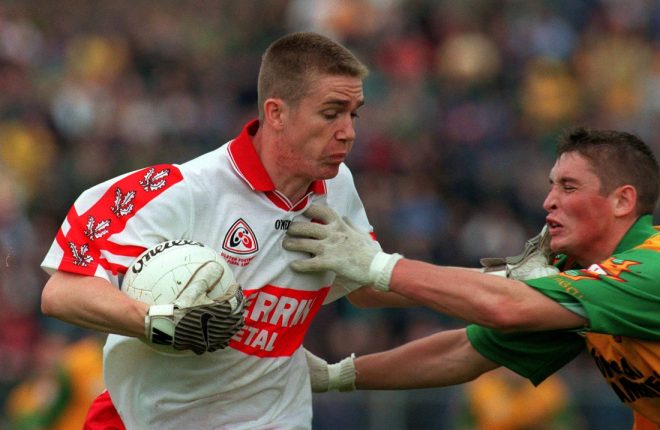
MY BALL…Joe Cassidy in action during Derry’s 1998 Ulster final win over Donegal
He recites the 1-14 to 0-16 scoreline like it was yesterday, not forgetting Raymond Cunningham’s ‘point’ that was clearly wide and a double bounce not being punished in the lead up to another Breffni score.
“We definitely underestimated Cavan,” Cassidy admits. In his view, Sam was within reach. Tohill was in “flying” and Joe Brolly was in “his pomp” after picking up an All-Star the previous year.
John McEntee smiles at the mention of Brolly, recalling the amount of talking he did on the pitch. Cassidy agrees, rolling the years back to his league debut at full forward in Kildare.
Brolly was chatting to his marker Anthony Rainbow all through the game. Rainbow was having none of it, but Brolly’s 1-3 and playmaking skills helped Derry to victory.
Derry had three league titles in the nineties and lost another final in 1998 before seeing off Meath after a replay to win it again in 2000.
“The difference with us and Armagh, we were coming into a changing room and started to take things for granted,” Cassidy offers. The hunger wasn’t there to keep on trucking.
“John and those Armagh boys were hungry after not winning anything for so long and you had McGeeney in the middle of that.”
***Mullins stepped away from Derry after the 1998 season, with Eamonn Coleman making a return and taking MacRory Cup mastermind Adrian McGuckin in to make the dream ticket after McGuckin’s laying of the foundation for the 1993 success at school level.
Henry Downey’s textbook shoulder on Paddy McKeever was deemed a free which Cathal O’Rourke slotted over before Marsden’s winner shot Armagh into the final and on their way to the first of seven Ulster titles across their decade at the top.
McEntee’s memories are more tuned into their All-Ireland semi-final defeat to Meath. It was the days when only the four provincial winners entered the race for Sam Maguire and Armagh had their eyes locked on the big prize.
The new blood had an appreciation of what the elder statesmen gave to the orange jersey and wanted them to taste success before hanging up the boots.
There was also a deep desire to raise the standard. The players pushed hard off the pitch and led by example on it.
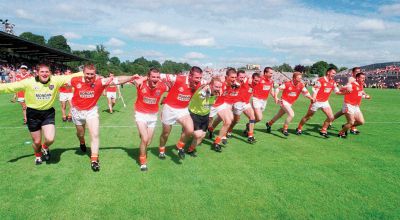
CELEBRATION TIME…Armagh bask in the glory of retaining the Ulster title in 2000
“We were young and all we wanted to do was to play football,” McEntee said. Compared to now, tactics were primitive, but Armagh knew how to maximise them.”
It was all about getting the ball to the forward line and as quickly and efficiently as possible. Much like the current team, they were blessed with options inside.
Steven McDonnell had two good feet, hands like glue and could turn on the sixpence. But he was slight. After leading the 1998 u-21 attack, he hadn’t the size to make the immediate breakthrough.
“In that 1999 season, he was corner-back on the second team at training,” McEntee recalls.
“He was like a willo the wisp, he’d run up and down all day long and he’d get the ball…one, two and he’d kick it over the bar.”
When McDonnell forced his way into the 2000 attack, it was another assassin. With 13 seconds gone in the Ulster final, McEntee lamped a high ball on top of Barry O’Hagan and McDonnell hoovered up the scraps and over it went.
That was Armagh’s tactics in a nutshell before it was polished into the sliced diagonal ball to the outside of the man, decommissioning the defender and opening the door for a score or a support player on the loop.
“If he got half a yard on you at all, he’d kick the ball over the bar,” McEntee added of McDonnell. “He had radar feet and he wasn’t on his own.”
O’Hagan, Marsden and Oisin McConville would all win their own ball. Ronan Clarke was another part of the same blueprint when he joined in the All-Ireland winning year.
***
In the late nineties, tension around the Orange Order’s marching season had a say on where training took place. It was the days before Callanbridge was in vogue and much of the preparation centred around Davitt Park in Lurgan.
“It was a nightmare going up and down the road and we used to have constant trouble with the police stopping us,” McEntee said. The standoff around Drumcree Church and Lurgan’s Garvaghy Road added uncertainty to the week of an Armagh player.
Things changed with the switch to Sheelagh, a club based in Crossmaglen parish but over the border in Louth.
“At that time of the year, we were competing for Ulster and the All-Ireland,” McEntee added of those glorious hot summers dominated by mouldie boots, bare hands on the ball and a firm sod.
“I don’t ever remember us having a problem getting numbers at training, I think it was just safer to be in Sheelagh and they were very good to us.”
Joe Cassidy also remembers that era. In the time after the abduction and murder of Bellaghy chairman Sean Brown, advice filtered through to vary the route to training.
“There was a spell in ’98 and after the 12th (of July), we were coming into the All-Ireland time in August,” Cassidy explained. “There was a night training was cancelled, lots of stuff had kicked off in Belfast around the parades…but it was isolated.”
When Derry came into the 2000 championship final as league champions, they had the favourites’ tag but had a semi-final scare against Antrim. They needed Tohill to pull a Sheeny McQuillan kick from over the crossbar to earn a replay.
To say Coleman was livid was an understatement. Cassidy remembers seeing the “real Eamonn Coleman” in the two weeks before the replay.
“He went absolutely nuts for two weeks because that was a big blight on him as a manager when we drew with Antrim,” Cassidy said.
“With all due respect, Derry shouldn’t have been drawing with Antrim and nearly got caught.”
Before the drawn game, and just two years after the Good Friday Agreement, Gerry Adams walked – holding his grandchild – into the Derry dressing room as Coleman was in mid rev on his speech.
Cassidy thought it was Gerry’s innocuous call to welcome Derry to West Belfast. At the meeting before the replay, Coleman made it clear. Nobody would be setting foot inside the dressing room. Not Adams, Nobody. They’d be given a short shift.
A refocused Derry were nine-point winners, but by the final Coleman had to watch from the stand with an earpiece after comments made about an official resulted in a touchline ban.
“We went in as (Ulster) favourites on the back of winning the National League,” Cassidy explains. “But you have to appreciate Armagh won it the previous year and it was the best two teams coming head-to-head.”
Brolly, Tohill, Kieran McKeever, Seamus and Henry Downey were coming to the end of their career and Armagh were on the climb. McDonnell’s early goal had Derry chasing the game McEntee felt Armagh dominated. Looking back now, he feels there might be a rose tint in his sunglasses, but it was a enjoyable game. There would’ve been the stay passes from the style of play, but handling and the other facets were crisp.
With their early lead and Enda Muldoon creating havoc, Derry pulled Johnny McBride outfield where he dominated the game, but it allowed Justin McNulty to drop deeper to help Gerard Reid close the door on any direct Derry ball.
“The goal we got; Brolly hit a big high ball across. Enda broke it down and (Ronan) Rocks gave it to McBride and he hit an absolute rocket into the top corner,” Cassidy said of McBride’s 61st minute goal levelling the game at 1-11 each.
The game floated from pillar to post before Oisin McConville clipped over a late winner. There was a chance for Derry to save the game from the last kick only for Tohill’s monster free tailing to the right from well outside the 45-metre line.
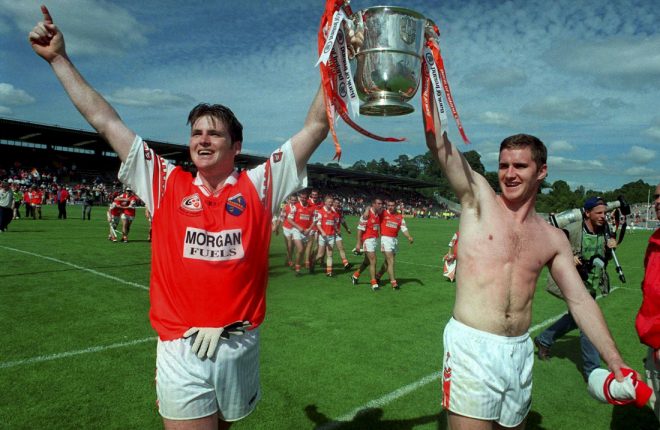
BACK TO BACK…Kieran Hughes and John McEntee celebrate with the Anglo Celt Cup in 2000
“A lot of things went right for us and we could’ve lost the game,” McEntee said. “We dominated the game for the most of it.
“Had they got the draw, Derry could’ve gone on the won the next day. A lot of the (Derry) guys didn’t play as well as they could’ve. I think Derry would’ve had a lot more to offer in a replay than we would’ve had.”
McEntee looks at another two factors in Armagh’s victory. The first was a tale of the changing of the guard. He saw Henry Downey as one of the best centre-back of his time and recalled not getting a kick off him in a previous Derry game.
“He made me look like a very small young boy and I couldn’t cope with him at all,” he admits of his duel with Downey. “In 2000 he didn’t have the same influence on the game. So, for me, that was a defining thing.”
The other was how Armagh got the match-ups right. Paul McFlynn was one of the best wing-backs in the game, but the teak-tough Cathal O’Rourke imposed himself on the game
“He was a real wise head on the field and played his own game,” McEntee said of McFlynn. “He didn’t have the same influence as subsequent years when he literally dominated the half-back line.”
On Sunday, Cassidy will be among the Derry 1998 team introduced to the crowd to mark 25 years of their success. McEntee will tuck into the crowd to watch his former skipper McGeeney lead Armagh in a bid to end their Ulster famine.
They shared a dressing room and a trip to Australia, but they’ll be back in opposite corners again.
Receive quality journalism wherever you are, on any device. Keep up to date from the comfort of your own home with a digital subscription.
Any time | Any place | Anywhere




